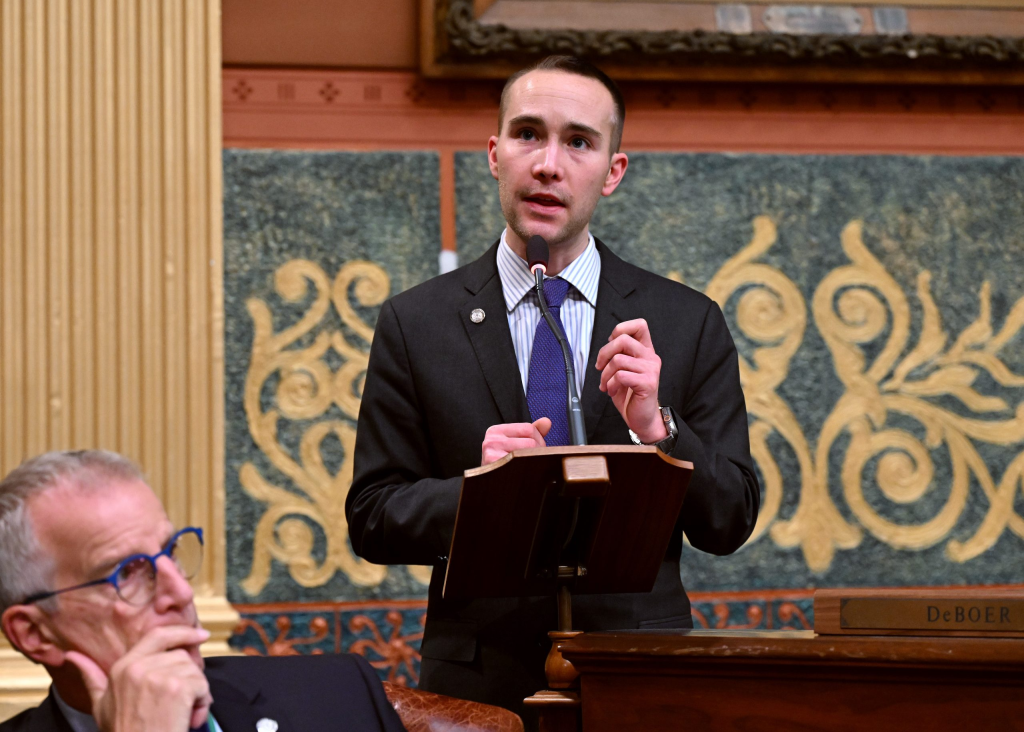Bipartisan Michigan lawmakers have taken a significant step toward improving government transparency with the introduction of two new bills aimed at banning non-disclosure agreements (NDAs) in the state legislature. On Thursday, state Reps.
Steve Carra (R-Three Rivers) and Dylan Wegela (D-Garden City) unveiled HB 4052 and HB 4053, which would prohibit lawmakers from entering into NDAs regarding any information they gather during their official duties. This issue has become a point of contention in Michigan politics over the past several years, with critics arguing that NDAs allow secrecy and potentially corrupt practices to thrive.
Rep. Carra expressed strong opposition to the use of NDAs, stating that elected officials have a fundamental responsibility to be transparent with the public. He emphasized that government officials should never engage in secretive practices that could hinder the public’s right to know about their actions.
“Elected officials have a duty to be as open and transparent as possible,” Carra stated. “Lawmakers should not trade their silence for information or proximity, using this underhanded tool for the practice of developing corporate welfare schemes.”
Carra’s comments reflect a growing concern about the use of NDAs as tools to conceal information that might be embarrassing or damaging to political figures or corporate interests. In his view, NDAs have often been linked to shady deals that primarily benefit those who are politically connected, rather than serving the broader public interest.
He pointed out that this practice has a proven history of failure and undermines trust in government. By introducing these bills, Carra and Wegela hope to put an end to the secrecy that NDAs often create, making it harder for voters to hold their elected representatives accountable.
The use of NDAs in politics has been a topic of debate in recent years. While they can be used to protect sensitive information in certain contexts, critics argue that they are more often used to shield corruption, prevent public scrutiny, and protect powerful individuals or organizations.

In Michigan, some critics have pointed to NDAs that have been signed by lawmakers, which they claim have helped conceal unethical behavior or unfair practices. By banning NDAs, these bills would create a more transparent environment, where the public can access the information necessary to make informed decisions about their elected officials.
The introduction of these bills marks a significant moment in the ongoing push for government transparency in Michigan. Supporters argue that the public has a right to know what their elected officials are doing and that keeping information behind closed doors only erodes trust in the political system.
Lawmakers are supposed to serve the people, and by introducing NDAs into the equation, critics say, they are allowing special interests to gain an unfair advantage. The proposed legislation seeks to prevent this by ensuring that all actions taken by lawmakers are open to public scrutiny.
Both Carra and Wegela have emphasized the importance of ensuring that lawmakers remain accountable to their constituents. Carra pointed out that the real damage caused by the use of NDAs is not just the lack of transparency, but the way these agreements have been used to protect the interests of the politically connected.
According to Carra, the people who benefit most from NDAs are often not the voters, but the corporate elites who can influence political decisions behind closed doors. By ending the practice, lawmakers hope to stop this cycle of corruption and ensure that decisions made in the legislature are for the public good.
The bills have garnered mixed reactions from both supporters and critics. Those in favor of the proposed changes argue that banning NDAs would be a powerful step toward restoring trust in the legislative process. They see it as a way to ensure that lawmakers are not using secrecy to shield their actions or protect special interests. For many, it is a chance to promote a government that is more transparent, where citizens can easily access the information they need to hold their representatives accountable.
On the other hand, some critics worry that the legislation could inadvertently harm lawmakers’ ability to handle sensitive or confidential information. For example, there are concerns that some types of agreements might still be necessary to protect trade secrets or other private information that could be vital to the state’s functioning. Despite these concerns, Carra and Wegela argue that the benefits of transparency far outweigh any potential downsides.
The push to eliminate NDAs is part of a broader movement for government accountability in Michigan. In recent years, there have been increasing calls for lawmakers to be more transparent about their actions and decision-making processes.
The state’s residents have grown frustrated with the lack of openness in government, and there is a growing desire for changes that will restore public trust. If passed, HB 4052 and HB 4053 could set a new standard for transparency in Michigan’s state legislature, ensuring that the public has access to the information they need to make informed decisions about their representatives.
In the end, the success of the bills will depend on the support they receive from other lawmakers and the public. However, the introduction of these bills signals that there is a significant shift in how lawmakers view their role in government. By pushing for more transparency, Carra and Wegela hope to create a system that prioritizes openness and accountability over secrecy and political favors.
Disclaimer: This article has been meticulously fact-checked by our team to ensure accuracy and uphold transparency. We strive to deliver trustworthy and dependable content to our readers.

